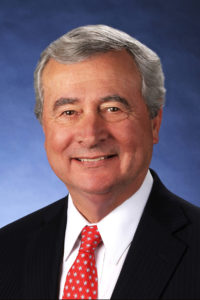
RCCC president, Dr. Carol S. Spalding, and student speaker, Roa Saleh
By Erica Batten. Will “badges” replace the traditional four-year college degree? The average college graduate now owes more than $35,000, according to a recent study conducted by the Hamilton Project, an economic policy initiative at the Brookings Institution. Perhaps that’s why high school grads are looking for alternatives.
“Traditional college credentials, based on arbitrary amounts of time spent in obsolete institutions, will fade into memory,” said Kevin Carey in his book, “The End of College.”
“Overcoming the college diploma’s tick-like embeddedness in the labor market will require the creation of credentials that have huge advantages over the traditional diploma,” Carey said.
“Some people get an education without going to college. The rest get it after they get out.”
– Marc Twain
He’s talking about a new breed of credentialing evolving from open courseware offerings at MIT and other heavy-hitters in the traditional university network. In this 21st century schematic, anyone can complete courses from any number of organizations and receive electronic, verifiable “badges” that certify what the student knows and is able to do. What’s more, these badges can accumulate over a lifetime of continuing education.
In other words, the “University of Everywhere” could spell an end to college—and the four-year degree—as we know it. And with that end, the student debt crisis may also be a thing of the past.
Carey envisions a future in which “belonging to a learning organization will not involve massive expenses and crippling amounts of debt.”

ZEISS
That’s big news to a nation whose student-loan debt now tops $1 trillion.
Community colleges now educate nearly half of all students in higher education, said Central Piedmont Community College President Dr. Tony Zeiss. He says CPCC has a reputation for meaningful job training.
“We get [students] trained and in jobs faster than four-year colleges or universities,” Zeiss said. “We are now developing fast-track training programs that will accelerate this process even faster.”
Zeiss said job placement rates are especially high in the health professions, trades, culinary fields and information technology.
“Some programs, like Non-destructive Examination, have employers offering to hire every graduate they can produce,” Zeiss said.
“We get [students] trained and in jobs faster than four-year colleges or universities,” Zeiss said. “We are now developing fast-track training programs that will accelerate this process even faster.”
– Dr. Tony Zeiss, CPCC President
A 2012 report from the Georgetown University Center on Education and the Workforce showed that the number of certificates awarded has skyrocketed some 800 percent over the past three decades.
Carey said the traditional university system evolved hand-in-glove with professions to create a kind of mutually-beneficial shorthand. The four-year degree stood not only for academic accomplishment, but also for a certain amount of commitment, responsibility, and experiential sameness. For employers forced by the vastness of society to hire strangers, the degree saved a lot of time. Subsequently, a college degree became a legal prerequisite for entering some professions.
Unfortunately, limiting potential employees to those possessing a certain piece of paper also meant excluding scores of workers whose life experience, employment history and personal interests made them better candidates.
Carey thinks the “University of Everywhere” will solve this problem by offering credits from a vast array of schools and other organizations. According to a recent “New York Times” story, such titans as NASA, 4-H and the Smithsonian are also experimenting with badges.
It’s not that the notion of education happening outside school walls is new. More than a hundred years ago, Mark Twain famously quipped, “Some people get an education without going to college. The rest get it after they get out.”
What’s new is that alternatives are opening up so that no matter how students get their education, they can get credit for it. The question is, will employers accept this new digital shorthand, or will they continue to rely on traditional degrees to screen candidates? With the student-loan crisis at record levels, it may be a gamble students are willing to take.

Discussion
No comments yet.